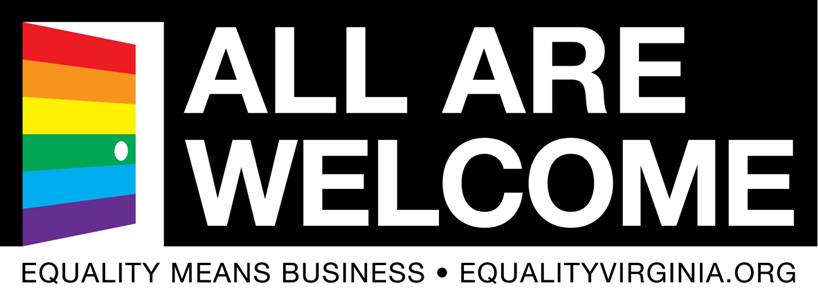Frequently Asked Questions
Below are some helpful answers to frequently asked questions about Equality Means Business (EMB). If you have a question that is not addressed below, please contact us at [email protected] or 804-643-4816. This information is not intended to provide legal advice and should not be relied upon in lieu of consultation with an attorney. The materials have been prepared for education and information purposes only.
1. I don’t own a business, but I want to ask my favorite restaurant to join Equality Means Business. How do I do that?
Great! You can actually ask any locally owned business (salon, day care, bed and breakfast, coffee shop, etc.) to join. Unfortunately, chains and franchises do not qualify for EMB membership. To help you get started, we’ve created a friendly guide to walk you through the process – click here to access the next steps you can take. You’ll see how easy it is to ask shop owners to join.
2. I do not discriminate against any of my customers or employees already. Why do I need to sign this?
Joining Equality Means Businesses allows you to more directly benefit from being a welcoming place for LGBT people, their friends, and families. If you complete our membership form, your business will be listed in the Equality Means Business online directory, and you will receive for free an Equality Means Business certificate and sticker to let everyone know that your business is a welcoming place to work and to shop.
3. What do sexual orientation and gender identity mean?
“Sexual orientation” is a term used when referring to an individual’s physical and/or emotional attraction to the same and/or different gender. Gay, bisexual, and lesbian are all examples of sexual orientations.
The term “gender identity,” is different from the term “sexual orientation.” Gender identity refers to a person’s innate, deeply-felt psychological identification as a man, a woman, or another gender. Some people are cisgender, which means that their gender identity is the same as the gender assigned to them at birth. Other people are transgender, which means that their gender identity is different than the gender assigned to them at birth.
4. Does this mean I have to install new bathrooms?
No. While single stall, gender-neutral bathrooms are something many people appreciate, they are not necessary to accommodate transgender employees and customers. At a minimum, transgender employees must have access to the bathroom that matches their gender identity. If your business does have single stall bathrooms, we recommend using gender-neutral signage.
5. Can I still have an employee dress code?
Yes. While dress codes should ideally avoid gender stereotypes, transgender employees should at least be able to dress in a manner consistent with their gender identity.

